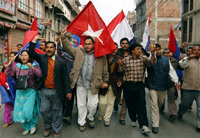Nepal's communist rebels declare cease-fire
Nepal's communist rebels declared a three-month cease-fire in attacks Thursday, easing a key burden on the new government poised to take control after weeks of bloody protests forced the king to reinstate Parliament.

The elusive leader of the Himalayan country's Maoist rebels, Prachanda, said in a statement that his group's fighters would refrain from any assaults for three months to give the country a chance for peace.
"We declare a unilateral cease-fire for three months through this statement to express deep commitment to people's desire for peace," the statement said.
The announcement came a day before the reinstated Parliament was scheduled to reconvene in Katmandu. It was expected to elect a new prime minister and initiate the process for electing a special assembly that would write a new constitution.
Until early this week, the country had been rocked by weeks of bloody anti-monarchy protests, organized by the opposition coalition of Nepal's seven main political parties and backed by the rebels, to force King Gyanendra to relinquish control over the government.
Security forces firing on protesters killed 15 people before the king announced late Monday that he would meet a key demand of the parties by reinstating Parliament on Friday and effectively handing power back to elected politicians.
The parties welcomed the move, but the rebels initially rejected the overture as a ruse for the king to hold onto his crown and warned the parties that their acceptance of the deal was a betrayal of previous agreements between the rebels and political parties. Both of them want to rewrite the constitution to limit the role of the monarchy, or eliminate it altogether.
However, by Wednesday the rebels had softened their position, lifting a weekslong blockade of key highways, and Thursday's announcement reflected a willingness by the rebels to give the country's politicians a chance to set up a constitutional convention.
The rebel's cease-fire announcement followed a conversation between Prachanda and Girija Prasad Koirala, the man chosen by the country's political parties to be the next interim prime minister.
The conversation helped ease misunderstandings between the two groups, said Koirala, a former prime minister.
The parties welcomed the rebel cease-fire.
"This will help bring the Maoists to the negotiating table for peace talks that could end the violent conflict," said Gopalman Shrestha of the Nepali Congress Democratic.
However, the rebels have made it clear that the cease-fire is for three months only and "with the intention to encourage the political parties to announce an unconditional special assembly," reports the AP.
I.L.
Subscribe to Pravda.Ru Telegram channel, Facebook, RSS!





